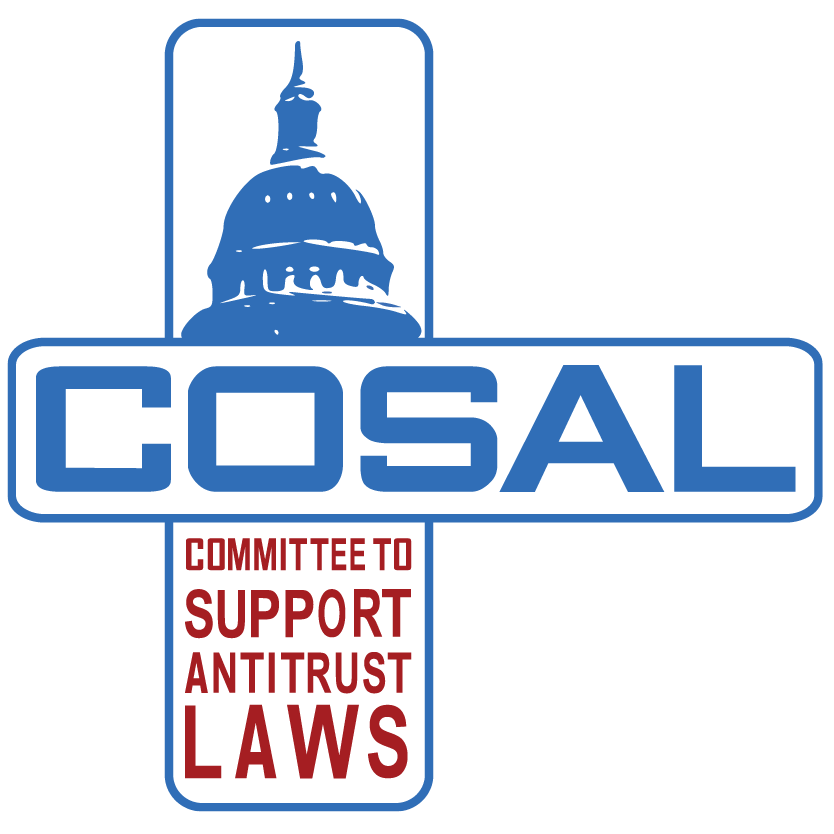Advocacy: Landmark Antitrust Legislation to Rein in Big Tech
House Antitrust Subcommittee Chair David Cicilline (D-RI) and Ranking Member Ken Buck (R-CO) introduced a groundbreaking package of bipartisan bills to rein in the power and dominance of the Big Tech platforms and enhance the ability of private and public antitrust enforcers to hold the companies accountable. The package of bills, grouped under the heading of “A Stronger Online Economy: Opportunity, Innovation, Choice,” are a response to the findings in the subcommittee’s 16-month investigation and report on the state of competition in the digital marketplace. The bills are perhaps the most sweeping reform to strengthen the antitrust laws since the Clayton Act was passed over one hundred years ago.
There are two significant aspects to these bills that are of paramount interest for COSAL. First, and most critical, two of the bills (American Innovation and Choice Online Act and the Platform Competition and Opportunity Act) include a private right of action modeled after the Clayton Act. COSAL worked hard to make sure that private enforcement was included to provide enhanced accountability and compensation for victims.
Second, the entire package has bipartisan support, including support from the Ranking Republican on the Antitrust Subcommittee. To have Republican support for such a strong set of antitrust reforms and for a treble damage private remedy is almost unheard of in modern U.S. politics. This is indicative of the widespread concern about the dominance that the Big Tech companies have over the lives of Americans, no matter their party or what region of the country they live in.
The press release accompanying the bills describes them as follows:
· The “American Innovation and Choice Online Act” to prohibit discriminatory conduct by dominant platforms, including a ban on self-preferencing and picking winners and losers online. The bill is sponsored by Chairman Cicilline and co-sponsored by U.S. Rep. Lance Gooden (TX-05). This bill includes a Clayton Act-styled private right of action.
· The “Platform Competition and Opportunity Act” prohibits acquisitions of competitive threats by dominant platforms, as well acquisitions that expand or entrench the market power of online platforms. The bill is sponsored by U.S. Rep. Hakeem Jeffries (NY-08) and co-sponsored by Ranking Member Buck. This bill also includes a Clayton Act-styled private right of action.
· The “Ending Platform Monopolies Act” eliminates the ability of dominant platforms to leverage their control across multiple business lines to self-preference and disadvantage competitors in ways that undermine free and fair competition. The bill is sponsored by U.S. Rep. Pramila Jayapal (WA-07) and co-sponsored by U.S. Rep. Lance Gooden (TX-05).
· The “Augmenting Compatibility and Competition by Enabling Service Switching (ACCESS) Act” promotes competition online by lowering barriers to entry and switching costs for businesses and consumers through interoperability and data portability requirements. This bill is sponsored by U.S. Rep. Mary Gay Scanlon (PA-05) and co-sponsored by U.S. Rep. Burgess Owens (UT-04).
· The “Merger Filing Fee Modernization Act” updates filing fees for mergers for the first time in two decades to ensure that Department of Justice and Federal Trade Commission have the resources they need to aggressively enforce the antitrust laws. This bill is sponsored by U.S. Rep. Joe Neguse (CO-02) and co-sponsored by U.S. Rep. Victoria Spartz (IN-05).
These bills recognize that dominance in today’s HighTech platforms is the modern day equivalent to the massive consolidation of power among railroads and oil companies that prompted the enactment of the Sherman Act. This bipartisan legislation is a much-needed correction to lackluster antitrust enforcement in recent years. The private right of action in the American Innovation and Online Choice Act and the Platform Competition and Opportunity Act is particularly important to supplement government enforcement consistent with the current antitrust enforcement structure. Private enforcement has long been recognized as a critical component of robust antitrust enforcement. Without the ability of victims of monopolization and other antitrust violations to bring lawsuits against the perpetrators, much wrongdoing will go unaddressed and innocent victims will be uncompensated.
COSAL applauds Representatives Cicilline and Buck for putting forward bold proposals to protect individuals and small businesses from the abusive and anti-competitive conduct of the Big Tech platforms. These bills will promote innovation and make the marketplace fairer while holding wrongdoers accountable. Congressman Cicilline summed it up well in his statement accompanying the legislation:
“The American people sent us to Washington to get things done. Nothing is more important than ensuring every American has an opportunity to get ahead. Right now, unregulated tech monopolies have too much power over our economy. They are in a unique position to pick winners and losers, destroy small businesses, raise prices on consumers, and put folks out of work. Our agenda will level the playing field and ensure the wealthiest, most powerful tech monopolies play by the same rules as the rest of us.”
COSAL is working with a broad coalition, including consumer groups, grassroots organizations and labor unions, to support the antitrust package. The first test for the bills comes on June 23rd, when the House Judiciary Committee plans to vote on the legislation.

